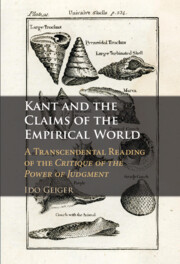 Kant and the Claims of the Empirical World
Kant and the Claims of the Empirical World Published online by Cambridge University Press: 30 April 2022
Chapter 3 tackles the considerable exegetical difficulties posed by the antinomy of teleological judgment. Although the Dialectic of Teleological Judgment poses an antinomy between regulative maxims of reflective judgment, it also presents a conflict between would-be constitutive principles of determinative judgment. This fact has led a number of readers to conclude that the latter conflict is the antinomy of teleological judgment and the former is its resolution – Kant’s explicit claims to the contrary notwithstanding. The chapter argues that posing the conflict between would-be constitutive principles of determinative judgment is explained by the attempt to assimilate characteristic features of a dialectic, specifically the fact that it ensnares ordinary understanding. Building on the earlier discussion of the distinction between explanation and description, it further claims that the regulative maxims of reflective judgment do not contradict one another, even as they are first presented, but in fact essentially complement one another. The maxim of teleology governs the description or observation of organisms as self-organizing beings; the maxim of mechanism directs us to seek to explain their generation and the processes they undergo mechanistically, just as all other causal processes are to be explained.
To save this book to your Kindle, first ensure [email protected] is added to your Approved Personal Document E-mail List under your Personal Document Settings on the Manage Your Content and Devices page of your Amazon account. Then enter the ‘name’ part of your Kindle email address below. Find out more about saving to your Kindle.
Note you can select to save to either the @free.kindle.com or @kindle.com variations. ‘@free.kindle.com’ emails are free but can only be saved to your device when it is connected to wi-fi. ‘@kindle.com’ emails can be delivered even when you are not connected to wi-fi, but note that service fees apply.
Find out more about the Kindle Personal Document Service.
To save content items to your account, please confirm that you agree to abide by our usage policies. If this is the first time you use this feature, you will be asked to authorise Cambridge Core to connect with your account. Find out more about saving content to Dropbox.
To save content items to your account, please confirm that you agree to abide by our usage policies. If this is the first time you use this feature, you will be asked to authorise Cambridge Core to connect with your account. Find out more about saving content to Google Drive.